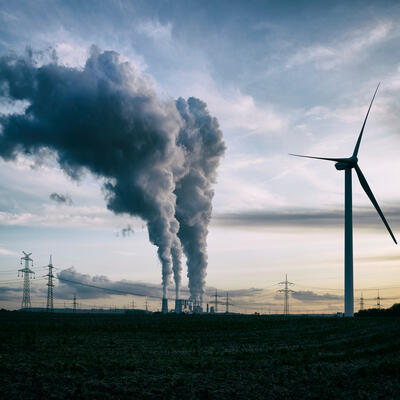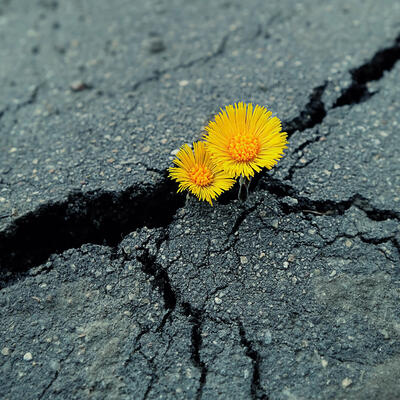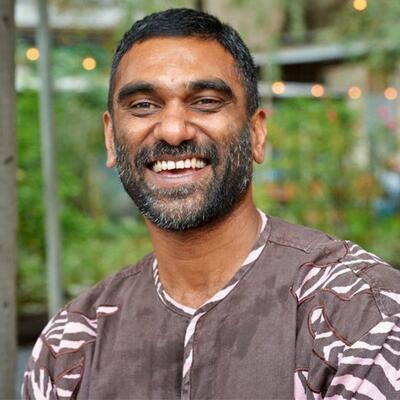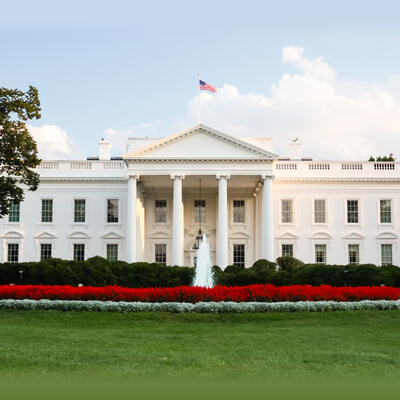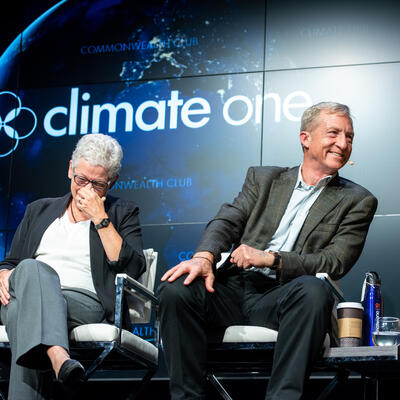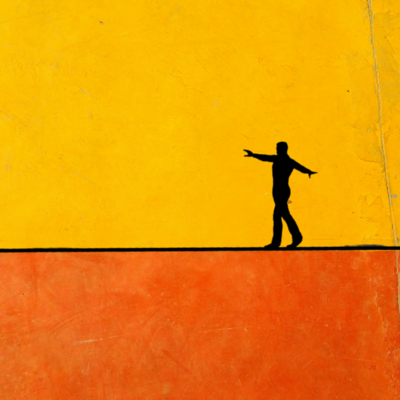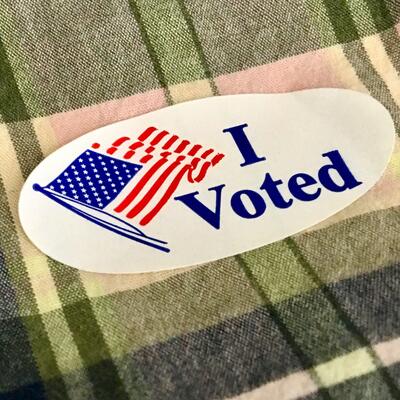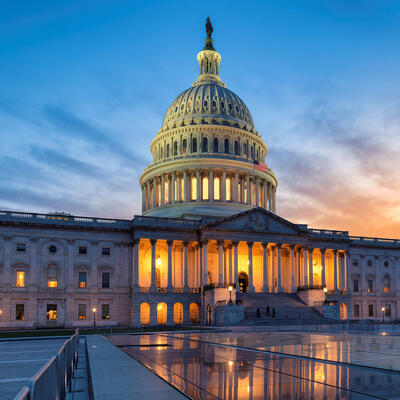
Climate Ambition with Gina McCarthy, Annie Leonard and Tamara Toles O’Laughlin
Guests
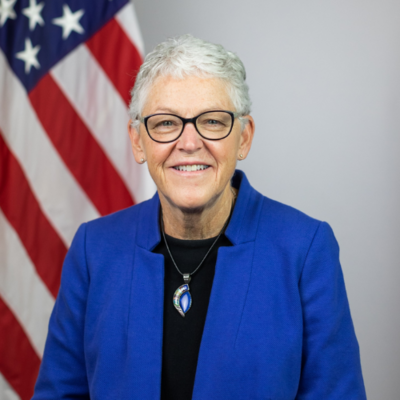
Gina McCarthy
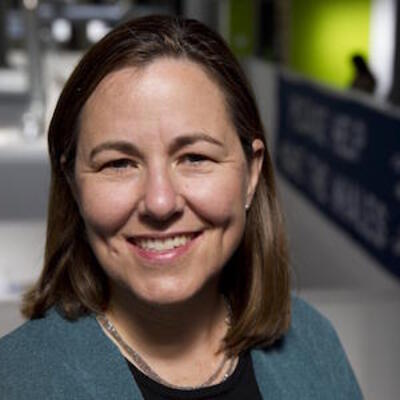
Annie Leonard
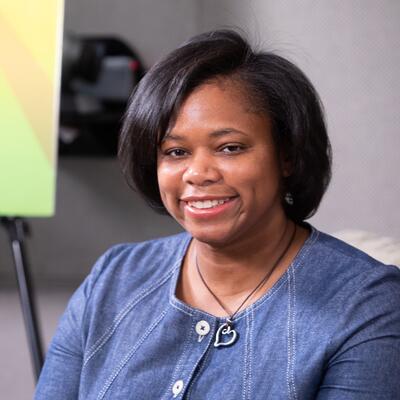
Tamara Toles O'Laughlin
Summary
Will Joe Biden take bold action on climate if he becomes President? And what lessons can be drawn from the failure of Barack Obama and Joe Biden to get a national climate plan in place when they were in office?
“The context is different than the last time Joe Biden was anywhere near the White House,” says Annie Leonard, Executive Director of Greenpeace USA. “The science has changed, [the] climate crisis is here now.”
Leonard insists that the time for comfortable, incremental action has passed. “We don’t have the luxury to solve one problem at a time,” she says, “but we don’t need to because the great thing is how much the solutions are interconnected.”
Other climate leaders are similarly unapologetic about calling for ambitious change. “We’re not calling for a referendum on business as usual,” says Tamara Toles O'Laughlin, North America Director of 350.org, ”we’re calling for the end of business as usual.”
O’Laughlin is particularly intent on putting politicians who fail to heed the climate call on notice. “This is about making sure nobody feels safe continuing to feed us a line instead of doing the work,” she says, “so there isn't a single person in any committee who can hide out in their office and not respond to that.”
Gina McCarthy, the US EPA chief during Barack Obama’s second term, is eager to feel the discomfort that O’Laughlin and Leonard are pushing for. “Of course it’s uncomfortable,” she says, “but we got to embrace it, right? This is the time for change.”
So will the Biden plan be that change? “It is by far and away the most aggressive climate plan of any presidency,” says McCarthy. “Can it get better? Sure, you’re sitting with three women advocates who are gonna demand better, but we’ll always do that because it’s never gonna be enough because we got to act to do it all now.”
Resources From This Episode (4)
Full Transcript
Greg Dalton: This is Climate One. I’m Greg Dalton. [pause] With the prospect of a Biden presidency on the horizon, what can we learn from previous attempts at a national climate plan?
Annie Leonard: The context is different than the last time Joe Biden was anywhere near the White House in that the science has changed, climate crisis is here now.
Greg Dalton: Biden’s climate plan would be by far the most aggressive and ambitious of any presidency. But is it enough?
Tamara Toles O’Laughlin: We’re not calling for a referendum on business as usual, we’re calling for the end of business as usual.
Greg Dalton: Can activism finally bring America’s political ambitions in line with climate science?
Gina McCarthy: Yes, I’m uncomfortable about all the change I need to do as quickly as people are demanding at NRDC and other places, of course it’s uncomfortable but we’ve got to embrace it, right. This is the time for change.
Greg Dalton: Climate Ambition. Up next on Climate One.
---
Greg Dalton: Will Joe Biden take bold action on climate if he becomes President? Climate One conversations feature energy companies and environmentalists, Republicans and Democrats, the exciting and the scary aspects of the climate emergency. I’m Greg Dalton.
Greg Dalton: Biden’s climate plan is the most ambitious of any presidential nominee and hopes are riding high that he will reassert US leadership on decarbonizing the global economy. Seven out of ten voters support action on climate and three quarters want the country to get all of our electricity from renewable sources within 15 years. Wildfires and extreme storms along with terrified kids are galvanizing public support. But as someone who’s been talking about climate for a living every day for 13 years, I’m having an eire feeling of deja vu and reflecting on how we got here.
Greg Dalton: Will Joe Biden take bold action on climate if he becomes President?
Climate One conversations feature energy companies and environmentalists, Republicans and Democrats, the exciting and the scary aspects of the climate challenge. I’m Greg Dalton.
Biden’s climate plan is the most ambitious of any presidential nominee and hopes are riding high that he will reassert US leadership on decarbonizing the global economy. Seven out of ten voters support action on climate and three quarters want the country to get all of our electricity from renewable sources within 15 years. Wildfires and extreme storms along with terrified kids are galvanizing public support.
But as someone who has been talking about climate for a living every day for 13 years, I’m having an eire feeling of deja vu and reflecting on how we got here.
[Clip montage]
Spring 2009. Early in President Obama’s first term, hopes for the country’s first national climate plan rested on the Waxman/Markey bill. It proposed a cap-and-trade program that would place a limit on greenhouse gas emissions while creating a market for companies to buy and sell permission to pollute. John McCain and Barack Obama both supported cap-and-trade, as did many of America’s biggest industrial companies.
But that window of opportunity didn’t last. The idea of placing regulation on industry and costs on consumers in a country recovering from recession generated fierce opposition and the bill didn’t make it past the House.
Republicans still favored cap and trade because it was market based and essentially created a new commodity to trade. In California Governor Arnold Schwarzenegger was advancing a cap and trade program that was seen as a possible model for the country.
But in 2010 the Tea Party burst on the scene and took aim.
[Clip: “Cap and trade, or as I call it tax and kill because it will tax us to kingdom come and kill jobs”]
One week before the 2012 presidential election, Superstorm Sandy hit the East Coast, causing Barack Obama and Mitt Romney to both briefly pause their campaigns. With climate-related storms rising, Obama focused on climate in his second term. He enacted the Clean Power Plan, rejected the Keystone XL pipeline, signed the Paris Agreement, placed limits on natural gas methane emissions, introduced stricter emissions standards on vehicles, and blocked oil drilling in the Arctic circle.
By 2016, the US had its most ambitious climate agenda ever.
But we all know what happened next:
[Clip: Donald Trump has Defeated Hilliary clinton to become president elect of the United States]
When President Trump took office, the rollbacks began. Within his first year he removed any mention of climate change from the Whitehouse websites, placed climate deniers and fossil fuel executives in leading environmental positions, repealed the Clean Power Plan, and withdrew from the Paris Agreement.
When Democrats took the house in the 2018 midterms, Alexandria Ocasio Cortez and other new members with ambitious climate agendas took center stage. She swiftly
introduced the vision of a Green New Deal with Senator Ed Markey.
(Press conference)
The resolution was an ambitious plan to move the country towards completely renewable energy in the next ten years while establishing a jobs program and other social services like medicare for all. The Green New Deal generated vast ridicule on the right, and exuberance on the left.
The Green New Deal is much more ambitious than the 2009 climate bill and is a rallying cry of the youth climate movement.
Joe Biden has embraced the Green New Deal as a framework, though he doesn’t often say its name. Still, his $2 trillion climate plan is more ambitious than any other presidential candidate in history.
Over the past decade the united states has wasted time addressing climate change at the scale that we need. In the 2020 election, if Joe Biden wins, and Democrats take the Senate, he and Kamala Harris may have a chance to make up for lost time.
Greg Dalton: That was freelance producer Julianna Bradley. On today’s show, three leaders of national organizations who will press Joe Biden and Kamala Harris to turn their plan into law if they win. Gina McCarthy is President of the NRDC Action Fund, and was chief of the US EPA in President Obama’s second term. Annie Leonard is Executive Director of Greenpeace USA. And Tamara Toles O’Laughlin is North America Director of 350.org, a grassroots environmental group. I began by asking Gina McCarthy what lessons can be drawn from the failure of Barack Obama and Joe Biden to get a national climate plan in place when they were in office.
Gina McCarthy: One of the things that thankfully I think Joe Biden did when he really was getting the nod for his nomination and before that happened is he spent a lot of time with environmental justice advocates. You know, he really is a person who was engaged someone in climate but I don't think it was as yet sort of ingrained into him. Well it is now, you know, because they personalize this for him. And he’s a very personally wonderful human being just from knowing him. So, the lesson is that for me has always been don't talk about climate as a planetary problem. Don't actually dissect it from all the other systemic challenges we have with conventional pollution and with systemic racism that has led to so many communities having disproportionate impact. And then make sure you talk about it in relevant terms. You know, I think way too much as green groups really just talk about the only thing, we care about is birds and bunnies who are lovely, but really, we’re all talking about human beings and human lives and needs to be related to families. It needs to be related on the ground improvements. So, my hope is that instead of running to now big solutions that don't dedicate real benefits to black and brown Hispanic indigenous communities first and foremost that those no longer the thing to shoot for. We need two-fers. I don't just want greenhouse gases I want fossil fuels gone. I want fossil fuels out of products. I don't want to help fossil fuel industry to extend their life. I want them to recognize that this is bringing down communities most importantly, environmental justice communities. And the best thing about Biden’s plan is he sent his justice and equity and he indicates and commits to 40% of the investments that we need to make to boost us out of our economic doldrums are actually going to be invested in environmental justice communities. So, between the time he started campaigning for this presidency and the time he was nominated. We now have a president thaiencet I believe has full throated the effort of addressing climate in his engagement in it and I'm really excited about it. It is by far and away the most aggressive climate plan of any presidency. Can it get better? Sure. You’re sitting with three women advocates who are gonna demand better, but we’ll always do that because it’s never gonna be enough because we got to act to do it all now.
Greg Dalton: Tamara Toles O’Laughlin, you say that when Joe Biden is fighting for real people he’s gutsy. How do you rate the Biden-Harris plan for climate action?
Tamara Toles O’Laughlin: I'd say it is the most ambitious plan to date. That actually says much more about the kind of president than it does about this particular moment that we’re in to be fair. But I do think there has been a real responsiveness to what our demands are. I'm here on behalf of young people on behalf of people who wouldn't consider themselves young in any space. On behalf of that multiracial multigenerational organizing that really pushed us to this moment. Recognizing that the establishment is not gonna get to where it’s going if business as usual is what's on the menu. So, it really does feel like we’re in a conversation about climate ambition because it was job one for all of us who care about this work to make sure that it was as important as any other issue. And really, the umbrella that it is because you can't talk about education or voting rights or any of the other things on a planet that does not exist. And I have said it before and I will say it again until I see a room full of bear sitting around trying to talk about how to save us from climate change people in planet is where the work is happening.
Greg Dalton: Annie Leonard, presidents typically have priorities and lots of people pulling on them. How will climate rank in the context of a global pandemic record unemployment. It's one thing to have a plan it’s another thing to get it through Congress once in power. And we saw last time that healthcare went before climate. Will that happen again?
Annie Leonard: Absolutely not. For a couple of reasons. One is we are not gonna do that the movement is so strong so united. The context is different than the last time Joe Biden is anywhere near the White House is that the science has changed climate crisis is here now. It is so clear that it cannot be postponed at this point with the timeframe we’re operating in, there’s no material difference between a climate denier and a climate delayer. We have to hit the ground running on day one. But the great thing is that we don’t have the luxury to solve one problem at a time but we don’t need to because the great thing is how much the solution they’re interconnected. We can do things like massive investment in clean energy, infrastructure that addresses environmental justice disproportional harm, it addresses the economic doldrums Gina referred to. The same things can solve all of these all at once if we have a comprehensive approach if we stay united which I have total confidence we’re gonna do.
Greg Dalton: Tamara, climate used to be about future generations. In recent weeks, we’ve seen climate crisis on both coast, wildfires of biblical proportions and five hurricanes spinning at the same time in the Atlantic. How’s the political calculus changing, especially for young Americans?
Tamara Toles O’Laughlin: I would say that we're in the middle of a four-generation time period. There are four generations of people in the workplace. There are four generations of advocates folks who started out at Woodstock with half an idea ended up with a job. And I speak on behalf of 350 and just say that, you know, we’re middle-aged at 10 years old because some groups started exactly 2 minutes ago, and others have been around for over 100 years. And we’re in a moment where we’re all pushing for the same thing at once. Energy needs wisdom and vice versa and so we are in a time when the youth agenda is no different than the black agenda than the indigenous agenda. Because at the end of the day we need to be in a space where we can move the needle for change because there is no separation of success here. We’re in a time test as Bill McKibben likes to call it. And I assure you that at the end when the buzzer is up, we’ll all be in the same boat so we might as well be running in the same direction. So, for youth who are raising it they are supported by middle-aged people who’ve been asking for it and by the elderly who are in my opinion are frankly willing to sacrifice everything. I’ve seen more seasoned people running out on the street to get arrested and putting their bodies on the line than I have in the last 15 years. If you find me a roomful of seniors, I probably got the most reckless bunch you've ever seen. We’re not calling for a referendum on business as usual we’re calling for the end of business as usual. We’re not calling for a wraparound plan where we figure out how to do a little bit of bad stuff. We’re calling for the end of sacrifice zones and that is about making sure nobody feels safe continuing to feed us a line instead of doing the work. So there isn't a single person in any committee who can hide out in their office and not respond to that.
Greg Dalton: Gina McCarthy, speaking of no one is safe everything is on the table. There’s a class of people in America who live on the coasts who maybe they’re environmentally oriented, they might write checks to NRDC or the Commonwealth Club or Climate One. A lot of them want to keep mainly market structures in place and take out brown energy and put in green energy and keep everything else in place and keep their comfortable life thousand place, is that realistic?
Gina McCarthy: No, I think life is changing and you know the reason why we’re seeing people my age on the streets is probably because we were given the gift of having grandchildren. And so, I'm not now worried about my sacrifice I am worried about handing to them a future that I’m gonna be proud of. And I’ve worked my entire life in this and if you think I wouldn't really talk turkey with some of these older people who think you can still remain comfortable and that you can sort of position yourself to get a little done, but only have much meaning in my life is just not right. And yes, I’m uncomfortable about all the change I need to do as quickly as people are demanding at NRDC and other places of course it’s uncomfortable but we got to embrace it, right. This is the time for change. The only thing that gets me up in the morning is to know that we are so bad off that change is essential. You know, I love the idea that there are people who have been comfortable sitting in Congress for 40 years getting used to this little march of really pokey people, right. If they just give a, you know, a sense that they can't be comfortable anymore that they’re not gonna hang around. I really think that's great. It's called democracy. You don’t do the will of the people and instead you want to maintain things as they are because it benefits you or because you don't think you contributed to the problem, then I’m sorry it’s just not working anymore. So, we got to get comfortable being uncomfortable. And we gotta stop trying to make it go away in a flash and really make people go away in a flash out of government. We haven’t figured out that we don't need little steady progress, but we need big leaps. We need those to be doable. We need them to bring people behind. We need them to shift jobs not leave workers behind. We need labor engage. We just have to be smart enough to recognize that this is a social system. When you fix the system, not a single thing in it you fix it all at once. And we can figure that out this is not rocket science.
---
Greg Dalton: You’re listening to a Climate One conversation about climate ambition. Coming up, the moral and strategic case for bringing everyone to the table.
Annie Leonard: To build a movement big and broad and inclusive enough to drive change at the level that we need to be able to take on the fossil fuel industry we need everybody. But we also need to do it because absent that, winning is not really winning
Greg Dalton: That’s up next, when Climate One continues.
---
Greg Dalton: This is Climate One. I’m Greg Dalton, and we’re talking about climate ambition with Gina McCarthy, president and CEO of the NRDC Action Fund and former chief of the US EPA under President Obama. TamaRa Toles O’Laughlin, North America director of 350.org. And Annie Leonard, Executive Director of Greenpeace. The “crying Indian” TV ad, launched on Earth Day in 1971, is one of the most iconic advertisements of all time. And it is still shaping our conversations today about how to confront climate disruption.
[Start Playback]
Male Speaker: Some people have a deep abiding respect for the natural beauty that was once this country. And some people don’t. People start pollution. People can stop it.
[End Playback]
Greg Dalton: The ad helped frame environmental issues as a matter of individual -- as opposed to corporate -- responsibility, as Annie Leonard explains.
Annie Leonard: That ad was very significant for me as a kid, you know. I was trying to explain to my 21-year old what a big impact it had on me. I remember back then there were only like four things you could watch at any time to choose from. So that means like a quarter of the population saw that at any time it was constantly near. And I took it to heart I thought people can stop, people start pushing, people can stop it. So, I picked up litter every day on the way to school I did exactly what they wanted me to do which was perfect my own individual action and focus on that. There were a couple of things with that. First of all, it’s not Indian it’s an Italian American, just to clear on that. Second of all, it was not created by a bunch of people it was created by a full environmental group that was launched by a bunch of packaging companies. Plastic packaging producers and users. And their goal was not to stop which in their goal was to get us to stop putting the heat on them and to put the heat on us. And it was enormously successful and my entire generation took it to heart and thought that by perfecting our individual actions we can solve these problems. And I want to clear and it’s really important that we recycle that we compost, you know, all those things are the right things to do but that’s not how we create big, bold system of change. At this point with the scale of the problems that we have doing things like carrying your own bag to the grocery store and not littering. Those fall in the category of flossing your teeth and washing your hands. Like this is basic adult hygiene. This is not deep political change. But it was so intentional because they know that when we come together, not as individuals, but working together as engaged civil society, that’s how we make change. And when I look at the climate movement now, we have every single thing we need. I think Gina or Tamara, one of you just said this is not rocket science. We know how to power our country. We know how to meet people’s needs in an equitable just and sustainable way. We have model economic policies we have innovative green technologies we have common sense. We have every single thing we need except the power to make it so. And that comes from people not focusing on perfecting your individual actions but working together. And that’s where the movement is now and that’s why we’re gonna see change. That’s why we’ve already seen Biden’s cheap plan move so much and we’re gonna move it even further.
Greg Dalton: Also, in 2005, BP popularized the concept of a personal carbon footprint and launched an online calculator in conjunction with this “Beyond Petroleum Campaign” run by Ogilvy & Mather. So, the very notion of I just learned this recently but in this a long time, the very notion of a personal carbon footprint was popularized by an oil company that was again focusing action back on the individual. Tamara, how can people think about more about systems than straws?
Tamara Toles O’Laughlin: Sure. Happy to jump in on that. But just first wanna flag that one, it’s an entirely different podcast. The conversation around how coal, oil and gas benefited from asbestos and trash’s legacy of creating the disinformation machine. We are not up against our individual choices for real reason because we've been told that we are our own problem and we are our own solution which allows us to overlook the 70% of things we could do together. So just want to flag that we’re not gonna save the planet the whales or any people if we’re not looking at the largest corporate actors. Seven out of 10 of the biggest things we could do to save this planet involve shutting down fossil fuels. Ending their reign on our democracy taking their filthy money out of our conversations. The way we talk about problems the way we frame solutions that kind of data that we use they have so infiltrated every part of this that there are many words that you have to believe if I use to talk about plastic is so much a part of our lives that we forget that it's another part of this conversation around what’s happening with coal, oil and gas. Every single thing you could touch within 5 feet of you is somehow connected to this industry and it did not happen by accident it happened because of a concentrated campaign to infiltrate your life with things you do not need and make you feel like you can't make change. So, getting together with other people to really focus on who the bad actors are with the largest bang for our buck would be if we get together leads you back to the same place ending the reign of fossil fuels in the climate decade. So, we’re in the same conversation whether we talk about recycling, composting, plastic straws, personal behavior. I get so many questions around whether or not we should change our eating habits. Sure, go ahead and change it I'm sure your health practitioner would be thrilled if you did. But the thing you could do for the planet is to really focus on loosening the grip of coal, oil and gas on our future and doing that with other people who agree do the same. And what I would argue is that if the problem is that we have all identified just in the beginning of this conversation are about design. The answer is redesign. Like and I think that's a lot scarier than people might think because it involves making the change that Gina referred to. But I can assure you redesign is what we know how to do best. We didn’t end up in this moment by accident roadways, airways, transportation, jobs, infrastructure, human health. We designed all of it and we designed the rest of the ecosystem and consigned it to our fate. So, it’s time for us to do the work of redesign by examining the premises underneath what we are talking about here. So, you really pushed my big-ticket item as an advocate, but systems level practice is about doing what you do as if you were everyone else and then asking for us to do more.
Greg Dalton: Gina McCarthy you've gone locked horns with the powerful fossil fuel interests in Washington. Exxon was recently removed from the Tao which is quite a symbolic measure in terms of its prominence as in the American economy. But the fossil fuel industry still has virtually endless amounts of money to defend their profit streams. You know, even if Joe Biden gets in there, there are still coal state Democrats still lots of concentrated power defending those interests. How does that play out?
Gina McCarthy: These fossil fuel companies are just literally shameless to be honest with you. So, they'll never go away. I think one of the biggest challenges we have to face and it was a challenge that was pretty much front and center in the Green New Deal and ends up being a significant sort of a push point in the Biden plan is that these Democrats are worried about the economy in their states. We have to acknowledge that we are worried about the economy in their states. I'm worried about jobs. That's why if it's a systemic issue you worry about the economy and jobs. It's not like we want to shut down all of the coal mining and just leave people to their own devices. We’re talking about a just transition. So, will that make them happy. Maybe not, but they have to get over the fact that the world is changing, it’s just how. And if you don't want a world that is going to change and shut everything down then we have to talk about transitioning the world we have to a new system. And, Greg, can I just react to two things Tamara said because it was pretty powerful. The first thing is this plastics issue drives me crazy. If anything drives me crazy it’s sort of this one because the fossil fuel industry is sitting under the radar screen as if the problem with plastics wasn’t theirs. The reason plastics don't go away as the fossil fuels in another form in the industry. As soon as they realize they might be phasing out of some part of the power sector. They started building huge plastics factories where? In Cancer Alley. Because these people need jobs nobody needs a new plastics factory. Everybody needs a job, right. And so, it's just the shamelessness of this. But the other issue that I want to hit is this. You know, we are overtaken now by people who just talk about individual freedoms. It’s this whole mask thing, right. As if they're exerting their own personal freedom. The United States was built in a certainly a regulatory structure. It was built on the fact that every human being has a right to air, clean air, clean water, clean land, a safe place to live a house over their heads good food to be able to eat, that’s individual freedom. Individual freedom isn't about masquerading by getting rid of regulations that are solely in place because you stop other people from having those fundamental rights and so you have to be regulated. See, so this is my life here. I don’t regulate to add burden I regulate to allow people to have their lives. And because otherwise how was a single individual or community going to stand up to a coal producer or company in their midst if it wasn't the government stepping in and doing its job to protect people. So, this whole sort of bastardization of the idea of individual freedom is really behind so much of the challenges we have today. You have no right to kill other people. You have no right to do that.
Greg Dalton: If you’re just joining us our guests at Climate One today are Annie Leonard, Executive Director of Greenpeace. Gina McCarthy is president and CEO of the NRDC Action Fund and former head of the EPA under Pres. Obama. And Tamara Toles O’Laughlin, North America director of 350.org. I'm Greg Dalton. Tamara there’s often a narrative that, you know, our house is on fire we got to put out this fire climate change. We can worry later about other things like who has many toys or racial justice some of this wealth distribution stuff that can wait later. And you say that, you know, some of the crescendo moments for you were Katrina and Flint, which show – yeah, tell us about the lessons from Katrina and Flint and the idea that racial justice should somehow come later.
Tamara Toles O’Laughlin: Sure. I would say that that's also a function of design. The work of environment and which began from the work of conservation literally involved the murdering and displacement of tons of people and then we focused on a blade of grass or pardon me a trigger warning sage grouse and a lot of people fought and died for that. I just want to flag that like there are a lot of things that we have put into very slim and narrow conversations around what is the environment. So it’s actually quite revolutionary in this moment that we can talk about people and planet because we wrote every law as though magic hands would make it happen. We didn't factor any impacts on how any of this was going to focus on people. We are in a moment where we really have a specific view of racial justice as a part of climate justice because to do anything else is to completely excerpt the future from the conversation at our end. We can no longer pretend that parks will be great if there aren't any people in them or that the next generation of people will be black indigenous or people of color despite what's going on in this country in so many spaces. The census has projected that we will be a multicultural people sooner than we think. And given if that’s true every part of conservation and environment and restoration practices for land, air, water, and all of that work comes together with the sacrifice zones that we have exiled our neighbors ourselves into. We have zoned people to death, and none of that is what the future looks like because coming together for integrated solutions to a lens where we do not accept people's identity as a reason to exclude them from doing this work because the future is us doing this work together. That sounds radical until you say it out loud and then it sounds ridiculous. Because what about being black indigenous or a person of color would make you anything other than an original steward of what we have going here. We are the people of the global majority. If you cannot see me, I am a black woman, so let me just put that out there. But we’re in a moment where we're doing this work authentically means making sure all the impacted folks are in the room not as a favor but because it gives us a strategic advantage on how to deal with the issues of our time. The stewardship issues we are facing now are not new. The crises and the urgency of failing to do stewardship work for this long has delivered us to this moment. So, whether we’re talking about standing up in an uprising with the movement for black lives. Recognizing that Latino votes are about Latino people like raising our issues around our race consciousness is actually the only defense we had left for the world that we’re in. You don’t have to be a futuristic care about climate justice you have to be someone who’s looking at the reality of what it would look like to try to do this work in the ways that we have done before and we can’t extract any further. We have to be in right relationship with each other as people before we can be a right relationship with the planet. So, it feels like a radical concept unless and until you think it through.
Greg Dalton: Gina McCarthy, so many white people had reckonings lately sort of understanding things of people of color, said yeah, we’ve been living with that and that’s new to you, it’s not new to us. What have you learned about your own white privilege since George Floyd was murdered?
Gina McCarthy: You know, myself and all of any -- a lot of people in my family and my friends and certainly my work colleagues. We, all of a sudden had to step back and realize that our old, you know, our old wisdom of -- I'm a good person, you know, I care about these things just sort of fell all apart. And I realize when I was doing work in climate that when you really think about all the work that needs to be done. You know, you're thinking about all the housing that needs to be retrofit you know and turned into electricity. You’re thinking of the transportation challenges then you watch COVID-19 hit and you realized, you know, all of these challenges the vast majority of them are really the result in many communities of just systemic racism. It started in federal law you know and it’s worked its way and it's still happening. And then you look at how you grow jobs and I'm not going to convince you know a coalminer to take a $90,000 a year job and then go put solar panels up for 20,000. We have to really look at the disparities here. And if we fail to do that there is no lasting solution here. We just got invited to be on a really great national committee that's looking at how to address the housing crisis and how to get the homeless people taken care of. You know why because I have a lot of young employees and staff people at NRDC who are working on energy efficiency for all which are programs that is really looking at doing energy efficiency in areas that have been left behind the poor communities. It’s saving them money it's reducing energy demand it's taking care of mold and houses that make our kids have asthma attacks. And you’re looking at this going this is how we want to act as environmentalists. I want everyone to come to my table. I want to recognize that going to this is where the action is because they can help define the solutions that are best for them. It’s the same with transportation. Everybody's gonna be making big EV announcements. I’d like to know how transits gonna recover from the economic, you know, sort of crisis that we’re in. If we actually think that the racial injustice can continue for a moment longer then we have missed the entire message that the three of us are trying to give today. It is part and parcel of why we are where we are. Somebody else design that world and we have to as Tamara says just redesign the whole thing and recognize that we’re just not on a path to sustainability. It's not gonna make my grandchildren the kind of future that they need to have. And we can’t tolerate it it’s a silly argument that just doesn't understand the kind of world we live in and the world we have to live in.
---
Greg Dalton: You're listening to a conversation about climate ambition. This is Climate One. Coming up, putting politics to work for the people.
Tamara Toles O’Laughlin: Politicians only do what we give them room to do and what you give them cover for. So look in the mirror and figure out how are you willing to go to get the world you want to live in and who you else you need to bring along with you because there is no such thing as a lone wolf that will save us from climate.
Greg Dalton: That’s up next, when Climate One continues.
---
Greg Dalton: This is Climate One. I’m Greg Dalton. We’re talking about Climate Ambition with Annie Leonard, Executive Director of Greenpeace. Gina McCarthy, president and CEO of the NRDC Action Fund. And Tamara Toles O’Laughlin, North America director of 350.org. Time for the Lightning Round, where I ask our guests to answer word-association questions with wild, reckless, unfiltered abandon. Beginning with Gina McCarthy, responding to the name of her former boss, Mitt Romney.
Gina McCarthy: What comes to mind is that he's been pretty good of late. I worked for him, I like him, he's a normal human being. And I actually got him to sign our climate action plan, but he put a little cover letter that said but I’m not sure about the science. That’s it.
Greg Dalton: Annie Leonard, what’s one word or phrase that comes to mind when I say John Muir?
Annie Leonard: Heavy mixed complicated _____ [00:43:08].
Greg Dalton: Tamara Toles O’Laughlin, the Republican party's stance on climate change?
Tamara Toles O’Laughlin: Nonexistent.
Greg Dalton: Gina McCarthy. Flint, Michigan.
Gina McCarthy: Painful.
Greg Dalton: Annie Leonard, the book Democracy in Chains.
Annie Leonard: Read it now.
Greg Dalton: Tamara Toles O’Laughlin. RBG.
Tamara Toles O’Laughlin: Everything. She’s everything.
Greg Dalton: Gina McCarthy, what comes to mind when I say China's pledge today to achieve carbon neutrality by 2060?
Gina McCarthy: Getting there.
Greg Dalton: This will be true or false. True or false for Tamara Toles O’Laughlin. Environmental groups have asked you to take jobs without real responsibility to make them look more diverse?
Tamara Toles O’Laughlin: False. I’m like brown bread. There’s no chance that I could show up with less density.
Greg Dalton: True or false. Gina McCarthy, academia is not your cup of tea?
Gina McCarthy: Correct. True. Yes.
Greg Dalton: Annie Leonard. True or false, there is a climate champion on the ballot?
Annie Leonard: False. We’d make one. There’s somebody we can make into a planet champion. But, you know, I should say to be determine, right? We’re waiting to see. But it’s up to us the climate champions are on this family. We are the ones that are gonna make him deliver on climate.
Greg Dalton: Gina McCarthy. True or false, national climate policy passed by one party will not be durable?
Gina McCarthy: That is true.
Greg Dalton: Last one for Tamara Toles O’Laughlin. You don't eat meat and you don't care if other people eat meat.
Tamara Toles O’Laughlin: True. I don’t give a damn.
Greg Dalton: That gets through our lightning round. We have a question from listener Allen. This is for Gina. How will a 6-3 right Supreme Court affect climate legislation and regulations?
Gina McCarthy: It's going to make everything extremely difficult. I mean, I don't think people realize that RBG was really solid on both climate and environment and people's access to the courts to challenge when government doesn't protect them. I mean, she was in the majority of the mass for CPA that really brought carbon pollution into the Clean Air Act and allowed us to regulate it. She was the one who said that people and communities if someone's polluting them and your government isn’t protecting you. You have a right to go after that, I mean she was the one that stood up for the Clean Water Act when it was being sort of rethought of in the Supreme Court. She's been fundamentally incredibly solid on the environment which should surprise nobody at this point, I think. So, we are in deep trouble on all those things. If you care about climate you better start voting for some really good senators and a president that's gonna make the kind of change we need. That’s the only way that’s gonna protect us. I think we need to really flip the Senate.
Greg Dalton: I want to talk about how we talk about climate change because there's a real research, Annie Leonard, that lot of people, even people who say climate is a concern. They don't talk about it very often. So, when people do talk about climate how should they talk about it because there's the doom and gloom. There are the facts that can confuse people. There is the righteousness there's lots of ways to shut people down pretty quickly when you bring up the topic climate change. What’s a way to open them up?
Annie Leonard: I think how you talk about climate depends on who you’re talking to, right? Like you don’t say the same thing to every friend that you have you tailor your conversation to the person and that’s what you have to do with climate change. For some, you talk about your grandchildren for some you talk about how awesome would be if you could have a clean way to commute to work on some mass transit. It should be the concern about democracy you talk about how we have to get fossil fuels out of our government. There’s lots of different entrée points but I think that the point of talking about climate change is really fascinating and important. Greg, and I’m talking about this the other day, the Yale Climate Communication Project has done some research on how people in the United States interact with climate. And what they found out is a significant majority of people it keeps growing, there’s around 75% of the public in the United States understands climate is worried about climate, want stronger government action. If 75% of the people agreeing and wanting stronger government action is enough to make it happen but then when they poll them about are, they active about it yet are they talking about it? They’re not yet. And there’s actually one place in the country where people say that naturally, in their conversations, climate came up which is probably because of you, Greg. But it is San Francisco it’s the only place where people are normally talking about climate change now. Well we can’t combat something that we don’t talk about. So, it’s really important for folks to get familiar with talking about it and whatever way is comfortable for you. Try different things, there’s lots of resources online. We got to turn the volume up on the conversation about climate change and make it exciting, not blame and shaming as you guys just talking about but exciting, inviting, really it is a potential way to have a much better – dealing with climate change is potentially we have a much better, safer, healthier future. And the more we can focus on that the more inviting it’ll be. So, everybody should commit to 10 conversations in the next week about climate change. See how it goes and then 10 more the next week. And end them with asking the folks to register and vote.
Greg Dalton: Tamara how do you talk about it? What do you find effective way to reach people out?
Tamara Toles O’Laughlin: Incessantly. I mean I’m a Brooklynite so there are a couple of things I do pretty regularly. Tell people I'm from Brooklyn if they don’t hear my accent or my hands gesticulating wildly and climate change, mostly because it is the umbrella to every other conversation. You want to talk about education, guess what’s going to impact whether or not people can get it where people would go for and the conditions, they would be in it. I feel like that character in the movie about the Big Fat Greek Wedding. Give me a topic any topic and will probably end up talking about climate change by the end of the conversation. In my community, that’s about stewardship. It's about community it’s about making space for people to operate as they have done with resources. And that means thinking about the future which is in danger if we don't get our hands around what we’re doing to drive climate change, and build out the worst trajectory we've ever faced as a species. So, I do think talking about climate is like talking about the weather if you will.
Greg Dalton: We have a question from listener Carol says. What is your best elevator speech to a non-voter who says candidates are all the same they all lie they’re politicians who failed us?
Tamara Toles O’Laughlin: Well, my gut is politicians only do we give them room to do and what you give them cover for. So, our politics are only as bad as our engagement. So, at the end of the day if you don't like what's happening you can push the button and make them move away. And if you want them to do more you can get out on the street and create an agenda for yourself. We are no longer in a time where we need a proxy, we set up proxies to make the work happen. So, I do think look in the mirror and figure out how are you willing to go to get the world you want to live in and who you else you need to bring along with you because there is no such thing as alone will save us from climate.
Annie Leonard: Listen, while our electoral system has disappointed us many times there is no way that Trump and Biden are comparable on climate and a huge number of other things. So just look at the policies and while neither is where I wish to neither one is saying that they’re willing to actually stand up to fossil fuels and say no new fossil fuel permits which is got to be official stuff. One of them is movable and the other is not and I would far rather push a moderate than fight a fascist, and they are very, very different.
Greg Dalton: Gina McCarthy, how much damage has been done to EPA and can it be restored in one presidential term?
Gina McCarthy: Well, I think, you know, with some of the rollbacks you know, I think certainly a lot of them are being challenged in court and they are losing because they didn't follow the science of the law. But I don't think that really properly characterizes the damage that have done. You know, I’ve been a career public servant all my life prior to going to NRDC and I loved every single minute of it. And I work with some of the most creative and smart and strategic thinkers that I've ever worked with and they knew what their job was and it was there to protect people. And maybe they couldn't go as far as people want maybe sometimes it didn't go well, but this president is really has undermined the scientific credibility of these agencies. I mean, scientists have left because they can't stand the kind of stifling that is being done to them and they want to do the right thing. And I think if you look at the past year or two the rollbacks are really being done challenging fundamental ways of reading the law and looking at science and they’re challenging procedures that have been in place since Ronald Reagan. And so, it's a dangerous time because many of those fundamental relooks at what the Clean Air Act says in the most creative ways to stifle protections are gonna end up at the Supreme Court. They’re gonna end up there we’re not going to get them out without that kind of fight. And you know that every industry is lining up to support all those appeals all the way up and hopes that a change in the Supreme Court is going to make the most foolish interpretation of the law. The law of the land. And so, we have to, you know, anybody that is just sitting around saying I'm not gonna vote. That's probably the worst position that anyone can take is indescribably bad and negligent. And if you don't vote you get exactly what you deserve, but the problem with that is I get exactly what you gave to me and I won't tolerate it. So, I give lots of speeches at colleges and in the end, I say okay, nice standing ovation how many of you are registered to vote? How many of you voted? And I tell them, if you’re not registered to vote you don’t vote, as soon as you possibly can do not stand up or even come in this door again. You know, we got to get serious and we’ve got to have hope that there’s someone we want to vote for in. And I know who I’m voting for and I’m gonna vote just like Mayor Curley in Boston said, “vote early and vote often” but don't do the often part.
Greg Dalton: Yeah, that's some guidance on that. As we wrap up I wanna ask you, you know, we talked about comfort and getting comfortable with being uncomfortable and people kind of thinking they’re addressing climate from the positions of comfort. What would cause you to, I don’t know, get arrested engage in civil disobedience do something for climate that you have never done before really get out there? I mean I’ve done lots of changes I can't say I've sacrificed; I’ve spent money, made modifications. What’s that next step? Tamara, what’s something would cause you, you have a young child, you know, what would cause you to really take that next step?
Tamara Toles O’Laughlin: As an African-American in this country I think I was born in a sacrificed zone. I live in a sacrificed zone. Having moved every three years for 20 years doing this work every place I've ever lived I've lived in a sacrifice zone in this body in this racist widget machine we call America. So, the sacrifices I'm willing to make to bring in other people who need to do this work. So, I work at 350 and 350 action is so much about educating political alignment bringing people into a conversation about what how it is they can weaponize their privilege. That's the sacrifice that I’m willing to make because the optics on that God is here cannot get us to the future. So, I’m willing to get into conversation with people who need to put their bodies on the line because it's their turn.
Greg Dalton: Annie Leonard.
Annie Leonard: I wanna reframe your question of course because first of all comfort is no longer one of the options on the list. That path is closed. So, the question is really which discomfort will you pick? And we’re gonna change by design or by disaster, either way. If we are proactive intentional if we center justice in our work, if we have the courage to take on the fossil fuel industry, we can change by design. If not, change is still coming but it’s a lot less just a lot more violent, a lot more painful. So, let go of any notion to think that comfort is one of the options. I’m also gonna challenge your sense of sacrifice, the use of the word sacrifice. Because what I’m gonna do, I just turned 56, my kid is done with college. I am liberated from a lot of the things that slowed me down when I was a young woman. For me, it is full steam ahead now. I am doing the rest of my functioning years to fighting climate and sacrifice is not the word I would associate that. I would associate courage and joy and having a meaningful life which anybody on this panel are listening would like to engage and some of us are against to resting. Please contact Greenpeace because we have awesome training and lawyers and we’ve love to show you how to do that. But sacrifice is not the word. I am gonna fight with everything that I have because honestly what is at stake is everything that we love. And I invite you all to join us.
Greg Dalton: Gina, last word.
Gina McCarthy: The only thing I would say is that if Trump wins again then I don't think there is any choice but to get out of our homes and to make our views heard. Now I am not talking about violence, but I am talking about the civil disobedience as a person. The civil disobedience that needs to happen when you realize that democracy has been taken from you. And I'm not talking about what I do as NRDC president because they don't like civil disobedience, but civil disobedience was the hallmark of huge change in so many ways. So, if anyone says, oh civil disobedience well think Rosa Parks is she a heroine or not? Think RBG, because I’ll bet if she was still alive, she’ll be trooping on the streets too
---
Greg Dalton: We’ve been talking about Climate Ambition with Gina McCarthy, President and CEO of the NRDC Action Fund, and a former chief of the US EPA under President Obama. Tamara Toles O’Laughlin, North America director of 350.org and co-chair of Green Leadership Trust. And Annie Leonard, Executive Director of Greenpeace.
Greg Dalton: To hear more Climate One conversations, subscribe to our podcast on Apple Podcasts, Spotify or wherever you get your pods. Please help us get people talking more about climate by giving us a rating or review. It really does help advance the climate conversation.
Greg Dalton: Kelli Pennington directs our audience engagement. Tyler Reed is our producer. Sara-Katherine Coxon is the strategy and content manager. Steve Fox is director of advancement. Devon Strolovitch edited the program. Our audio team is Mark Kirchner, Arnav Gupta, and Andrew Stelzer. Dr. Gloria Duffy is CEO of The Commonwealth Club of California, where our program originates. [pause] I’m Greg Dalton.
